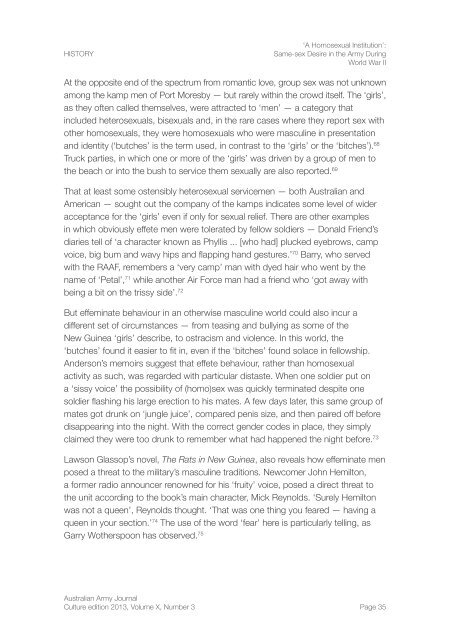Australian Army Journal
Australian Army Journal
Australian Army Journal
Create successful ePaper yourself
Turn your PDF publications into a flip-book with our unique Google optimized e-Paper software.
HISTORY<br />
‘A Homosexual Institution’:<br />
Same-sex Desire in the <strong>Army</strong> During<br />
World War II<br />
At the opposite end of the spectrum from romantic love, group sex was not unknown<br />
among the kamp men of Port Moresby — but rarely within the crowd itself. The ‘girls’,<br />
as they often called themselves, were attracted to ‘men’ — a category that<br />
included heterosexuals, bisexuals and, in the rare cases where they report sex with<br />
other homosexuals, they were homosexuals who were masculine in presentation<br />
and identity (‘butches’ is the term used, in contrast to the ‘girls’ or the ‘bitches’). 68<br />
Truck parties, in which one or more of the ‘girls’ was driven by a group of men to<br />
the beach or into the bush to service them sexually are also reported. 69<br />
That at least some ostensibly heterosexual servicemen — both <strong>Australian</strong> and<br />
American — sought out the company of the kamps indicates some level of wider<br />
acceptance for the ‘girls’ even if only for sexual relief. There are other examples<br />
in which obviously effete men were tolerated by fellow soldiers — Donald Friend’s<br />
diaries tell of ‘a character known as Phyllis ... [who had] plucked eyebrows, camp<br />
voice, big bum and wavy hips and flapping hand gestures.’ 70 Barry, who served<br />
with the RAAF, remembers a ‘very camp’ man with dyed hair who went by the<br />
name of ‘Petal’, 71 while another Air Force man had a friend who ‘got away with<br />
being a bit on the trissy side’. 72<br />
But effeminate behaviour in an otherwise masculine world could also incur a<br />
different set of circumstances — from teasing and bullying as some of the<br />
New Guinea ‘girls’ describe, to ostracism and violence. In this world, the<br />
‘butches’ found it easier to fit in, even if the ‘bitches’ found solace in fellowship.<br />
Anderson’s memoirs suggest that effete behaviour, rather than homosexual<br />
activity as such, was regarded with particular distaste. When one soldier put on<br />
a ‘sissy voice’ the possibility of (homo)sex was quickly terminated despite one<br />
soldier flashing his large erection to his mates. A few days later, this same group of<br />
mates got drunk on ‘jungle juice’, compared penis size, and then paired off before<br />
disappearing into the night. With the correct gender codes in place, they simply<br />
claimed they were too drunk to remember what had happened the night before. 73<br />
Lawson Glassop’s novel, The Rats in New Guinea, also reveals how effeminate men<br />
posed a threat to the military’s masculine traditions. Newcomer John Hemilton,<br />
a former radio announcer renowned for his ‘fruity’ voice, posed a direct threat to<br />
the unit according to the book’s main character, Mick Reynolds. ‘Surely Hemilton<br />
was not a queen’, Reynolds thought. ‘That was one thing you feared — having a<br />
queen in your section.’ 74 The use of the word ‘fear’ here is particularly telling, as<br />
Garry Wotherspoon has observed. 75<br />
<strong>Australian</strong> <strong>Army</strong> <strong>Journal</strong><br />
Culture edition 2013, Volume X, Number 3 Page 35

















